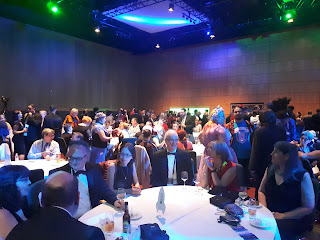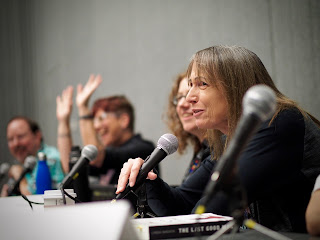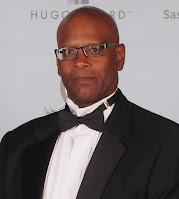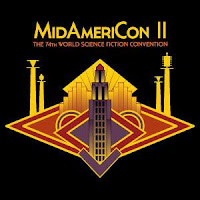 |
| The joy of losing a Hugo Award is one known by few. We're fortunate to have lost four times. (Olav Rokne photo) |
But, having lost at the Hugo Awards four times now, we feel somewhat qualified to provide advice on this subject.
Some years ago, Hugo-winning fanwriter Jim C. Hines summarized nicely and succinctly advice for those seeking to make a splash in SFF awards. He wrote:
- Write the best stuff you can.
- Never assume you’re entitled to an award.
- Don’t be a dick.
Armed with a heavy dose of humility and a few years of watching how people campaign for SFF literary awards, we have a handful of additional observations to share.
Engage With The Community
Social media is awash with accounts run by authors who rarely post anything other than promotional content aimed at selling their own books. It’s also worth letting people know who you are, what books you enjoy, and what your general vibe is.
Engaging with the community isn’t just about telling people how good you think your book or art is, it’s about listening and talking about the things that are important to them. Talk about politics, talk about art, talk about architecture, talk about music, and be authentic.
An excellent example of this is Marie Vibert. Years before she became a Hugo finalist, and even before we’d read any of her fiction, we already had a suspicion that she was a good writer because her Tweets were engaging, funny, and interesting. When her byline was in Clarkesworld, a lot of people in the community checked out her work in part because they already know who she is, and were happy to see her getting published.
Lift Other People Up
When you see something done within the genre that you enjoy, tell people about it. Being part of a community means celebrating the accomplishments of others in that community.
If you spend most of your time lifting other people up, then when you show enthusiasm for your own work it’s more likely to come across as genuine and joyful instead of self-serving.
Listen to Community Voices
There’s a lot of great community-based content in fanzines such as Nerds of a Feather and Galactic Journey. If you’re a podcast listener, take the time to tune into a couple of community focused podcasts like Hugo Girl and If This Goes On. Maybe even reach out to Seth at Hugos There, and see if there’s an opportunity to talk about an old book you love. Submit an article to a fanzine like Journey Planet. Send a news item to File 770.
 |
| Hugo winner Paul Weimer has written for … countless fanzines and guested on innumerable podcasts. (Olav Rokne photo) |
When you look at lists of existing Hugo winners, remember that the reason these works won is that people within the community voted for them. If you are overly vocal in your disdain for these works, their supporters will likely infer that your work is dissimilar to the stuff they like and will consequently not bother to read it.
If you loathe the Hugo Awards, and hate the people at Worldcon, don’t be surprised if the people at Worldcon are not fans of yours either.
It’s fascinating to see people on social media writing screeds about how much they hate the people who vote on Hugo Awards, while simultaneously complaining that they don’t win Hugo Awards.
Be Aware Of Community Standards
These standards have obviously evolved over time (for the better), and much of the conduct that was once ignored or even encouraged would probably (and correctly) preclude some celebrated authors of the past from winning today.
It’s also worth noting that people who are mean or condescending towards people within the community are less likely to earn Hugo Award nominations. We have seen at least one writer whose published work is brilliant … but who fails to earn award nominations. We suspect it’s largely because of how consistently they talk down to people.
Find Your Niche
This blog, for example, has built a following for both talking about the political economy of speculative fiction, and for a quirky iconoclastic humour. Both of these have niche audiences, and we’re continuously amazed — and thrilled — that our work has been appreciated by that portion of the Worldcon membership.
Humour is however … a bit like Marmite-flavoured icecream. Not every flavour is right for everyone.
Conclusion
Of course, there are a lot of readers, and a lot of active fans, who are not Hugo voters, so one can have a successful career without any risk of being nominated for this award simply because the two circles don't happen to overlap.



























